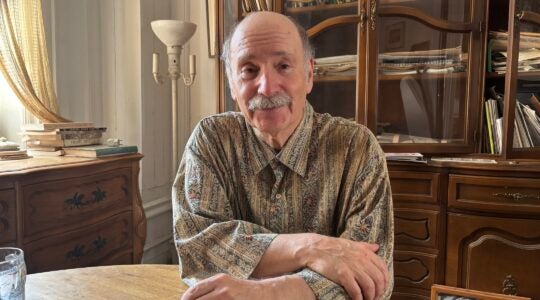Washington, D.C.: In 1911, Polish fish wholesaler Solomon Rosenstrauch, popularly known as the "Herring King," purchased an apartment building complex in a suburb of Warsaw.
On Tuesday, his grandson asked the United States to help get it back.
Theodore Garb, a 72-year-old retired furniture store owner from Seaford, L.I., believes the Polish government owes him the rights to the property (now worth about $2 million) that was taken from his family, first by the Nazis and later by Poland’s Communist regime.
Garb, a distinguished-looking, silver-haired son of a cantor, boarded a charter bus in Midtown Manhattan early Tuesday morning with about a dozen New Yorkers with similar claims.
They traveled here to attend a special congressional hearing on the problems American citizens are having reclaiming property and assets such as artwork, lost to their families a half-century ago in Central and Eastern Europe nations. Poland, Romania and the Czech Republic were cited as the worst offenders.
With the winding down of the Swiss bank and German slave labor issues, the restitution of Polish private property has emerged as a leading Holocaust assets cause for the Jewish community.
About three million Polish Jews were killed during the Holocaust, representing about 10 percent of the Polish population, and by far the largest group of Holocaust survivors. While Poland has adopted communal property restitution laws, and is returning synagogues, cemeteries and other community assets to the Jewish community, it says it cannot afford to return or compensate Jewish and non-Jewish private property.
But critics say it’s a human rights issue.
"I am here for justice," said Garb, himself a cantor who once operated Reliable Decorators on Church Avenue in Flatbush, Brooklyn. "We want the name of the original owners reinstated on those properties."
To bolster that effort, lawyers representing Garb and dozens of others announced a four-pronged strategy to force Poland to finally adopt a fair private property restitution law.
Speaking at a press conference shortly before a three-hour public hearing by the federal Helsinki Commission on Security and Cooperation in Europe, New York attorney Ed Klein said the new strategy against Poland includes:
# Filing lawsuits against major American and multinational corporations that purchased property from the Polish government that was wrongfully confiscated from Jewish and non-Jewish Poles;
# Lobbying President Bush to publicly raise the issue of private property restitution this week during White House meetings with Polish President Alexander Kwasniewski;
# Urging the Helsinki Commission to continue hearings and request Congress to lobby the U.S. State Department to make property restitution a high-profile U.S. diplomatic concern.
# Filing an appeal of a federal lawsuit against Poland that was thrown out last month by a Brooklyn federal judge.
"Poland has never really taken private property restitution seriously; they don’t believe it’s important for the United States," said Klein.
"But the issue is not closed: it’s just beginning."
Klein, accompanied by New York attorney Mel Urbach, named several American and multinational companies as candidates for such lawsuits, including Citibank, Sheraton Hotels, Heinz Corp., Heineken and Carlsberg breweries and Land O Lakes.
Klein and ally Antoni Feldon, chairman of the board of the Polish Industry Association, which seeks property restitution for non-Jewish Poles, explained that these companies bought the land from the Polish government knowing it was improperly confiscated.
"They buy Polish industrial properly cheaply, and that is a crime," Feldon said.
The strategy is for the lawsuits to cause the companies to force Poland to adopt a fair restitution law.
"With a small pinch you can move a heavy ass," Feldon said.
Poland is the only Eastern European country (outside of the former Soviet Union countries) that has failed to adopt a private property restitution law since the fall of Communism in 1989.
Klein said the tactic is inspired by the dismissal last month of a 1999 class-action suit filed in Brooklyn federal court against the government of Poland on behalf of Garb, 11 other named Jewish plaintiffs, and thousands of others who are seeking return of, or compensation for their homes or businesses.
Brooklyn federal Judge Edward Korman dismissed the suit last month, concluding that a 1976 U.S. law that allows limited lawsuits against foreign governments did not apply in this case.
But in dismissing the lawsuit, Korman stressed that Poland’s alleged conduct "may very well violate the evolving standards of the law of nations." And he suggested that "indeed a private individual holding title to expropriated property would not enjoy immunity from suit.
"I have written before that ‘strong moral claims are [not] easily converted into successful legal cause of action,’ " Korman wrote.
But he concluded: "The dismissal places on the Republic of Poland the obligation to resolve equitably the claims raised here."
On another front, Steve Winston, a Philadelphia attorney working with Klein said an appeal of Korman’s decision would be filed in the 2nd Circuit Court of Appeals in the next few weeks.
"We’re arguing that what Poland did was directed against a specific religious minority that brought its actions outside the run-of-the-mill expropriation of property into a category of violation customary international law."
Meanwhile, on Tuesday afternoon, Garb and others sat in Cannon House Office Building while the Helsinki Commission took testimony from several Jewish Holocaust claims leaders about the problems of getting back confiscated private property in Poland, Romania and the Czech Republic.
The commission is an independent federal agency composed of 18 U.S. senators and congressmen, including Democratic New York Sen. Hilary Rodham Clinton and Rep. Joe Crowley (D, Queens).
The commission called its third hearing on the issue since 1996 to hear about continuing obstacles for American claimants.
Witnesses included several New Yorkers; Yehuda Evron, U.S. president of the Holocaust Restitution Committee; Israel Singer, president of the Conference on Jewish Material Claims Against Germany; and Mark Meyers, an attorney and chairman of the Romanian American Chamber of Commerce.
"My wife lost every member of her family in the carnage of Poland during World War II," Evron said in emotional testimony. "All that is left from my wife’s family are some memories and her home. We don’t understand why Poland is creating additional suffering by denying us our right to our homes."
Evron, a Queens resident, stressed that while Poland dallies, Holocaust survivors in their 80s are dying.
"I am here today, over three years later, to tell you that Polish restitution is indeed uneven, has been unsuccessful and is discriminatory. "
Singer read a 1995 letter signed by a congressional delegation about the problems and noted that "not much has changed."
"I’m unhappy, and I come to you today not to make you unhappy, but to say that if I can’t sleep I would like for you to stay awake from time to time," Singer told the commissioners.
He said the issue is not money but morality and justice. Singer warned that the effort by Jews rightfully reclaim their property is fomenting anti-Semitism in Europe.
"How can we allow anti-Semitism to be the result of trying to do justice," he asked.
After providing a "report card" of restitution efforts by European nations, Singer said the U.S. needs to encourage these nations, through their ambassadors, to "do the right thing."
Randolph Bell, the Bush administration’s special envoy for Holocaust issues, testified for about 90 minutes about his continuing diplomatic contacts. But Sen. Clinton told The Jewish Week was less than impressed and said the U.S. role needs to have more teeth because "year after year we make the same arguments and hear the same issues."
"I thought [Bell] gave a realistic assessment, but it didn’t have the sense of urgency or focus that I would have liked," she said. "I think there is a lot of talk, but lines are not being drawn."
Clinton called for President Bush to publicly raise the issue of property restitution this week when he meets Poland’s president.
She also called on Congress to give consideration to her recommended legislation to create a National Foundation for the Study of Holocaust Assets, which would be an independent federal agency to conduct research, disseminate information, and develop policy on restitution issues.
Clinton introduced the Holocaust Victims’ Assets, Restitution Policy and Remembrance Act in the Senate in December 2001.
"The foundation will be the single most effective facilitator of the identification and return of Holocaust-era assets to their rightful owners and heirs ever supported by the United States government," she said.
The New York Jewish Week brings you the stories behind the headlines, keeping you connected to Jewish life in New York. Help sustain the reporting you trust by donating today.




